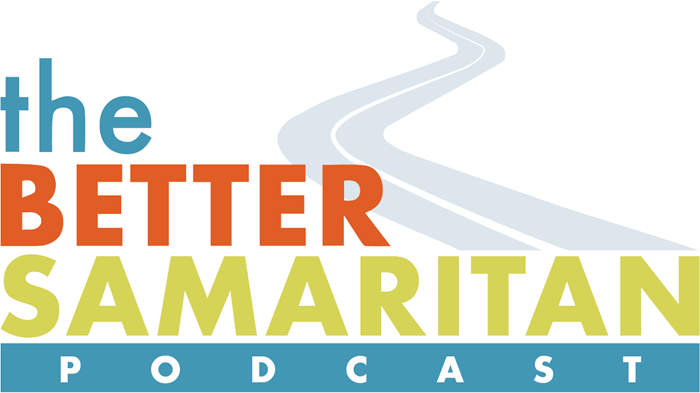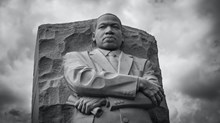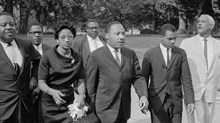How Do We Make the Jericho Road Safer for Those Coming after Us?

We started the Better Samaritan with the goal of addressing two things, inspired by Jesus’ parable of the Good Samaritan and the Rev. Dr. Martin Luther King, Jr.’s sermon on that parable:
-
How can we better help the hurting person in front of us?
-
How can we make the road safer for those to come in the future?
To that end, at the close of every episode, we ask the same five questions:
-
What has surprised you in your work?
-
How are you learning to do good, better?
-
What does humility look like in your field?
-
How can we make the [Jericho] road safer for those coming in the future?
-
How do you sustain hope?
We thought it would be fascinating to to compile all the answers to each question, one after the other, in order to notice what themes emerged. (Each full episode is linked, so you can go back and listen to the ones you find interesting.)
Our guests work diverse fields: public health, racial conflict, climate change, politics, and displacement, just to name a few. We found the resulting product to be fascinating.
Our fourth question: How can we make the [Jericho] road safer for those coming in the future?
There are those of us who have had opportunity and benefit of the doubt and access to power for so long that our natural inclination is to have our fists up when we feel like something is getting taken away from us. Because there’s this lived experience that this thing is by birthright, mine, because I was born with the experience that it was mine, and my dad was born with the experience that it was his, and so on and so forth. So there’s this natural inclination that some of us have to live with our fists up for fear that something’s being taken away from us.
So I would start with us, those of us who have any experience that this world is ours, this country is ours, this faith is ours, these streets are ours. If that resonates with you on any level, and I think this is an intersectional conversation, you could be black Christian and still be afraid of a Muslim immigrant that you feel like is coming to take away your faith or take away your streets, you could be white male, cis female, you know, this can cut across a number of ways for any of us, but if you feel like this world is yours by birthright or default, we can make the world a lot safer by choosing to lower our fists. By fostering postures and practices that get our fists down and by seeking to live in a more open posture of vulnerability and welcome.
It’s a discipline, it’s a practice, that we’re trying to undercut generations and generations of default programming that says, “this place is yours, it belongs to you, it’s your birthright, you don’t have to give it up to those people who are different than you.” But, in fact, we do have to give it up on some level to those people who are different than us, if our goal is to make the road safer.—Chief Executive Officer & Founder of Preemptive Love, Jeremy Courtney (Undercut the Old Narratives to Show the Love Jesus Requires)
I know the background of this podcast refers to a story Dr. King would talk about quite often. One of the times he talked about it was the night before his death. And he refers to something he thought Christians ought to have, which he termed a "dangerous unselfishness," which is just an incredible phrase. The temptation in our politics and our discourse right now would be to look at the person who walks on the other side of the road and completely write them off, saying "What an evil heart they must have to not cross over to the other side of the road."
King, on the night before his death, after all that he’d seen, after all not just the successful actions but also the unsuccessful ones, instead, that sermon was a great example of empathy for inaction. He tried to get inside the head of what rational explanations might people have for not crossing over to the other side of the road. And one of the things he comes up with is this idea that the fear of unanticipated harm is greater, that motivation overcame the knowledge of certain good.
And as Christians we really need to be careful that our political actions aren't motivated by a fear of unanticipated harm while leaving aside the fact that there’s someone dying on the side of the road that can be attended to. It’s not just a theory that they can be helped. We know they can be helped. We have to be willing to act.—Author and founder of Public Square Strategies LLC, Michael Wear (Loving Our Neighbor Through Divisive Politics)
I think we often look at things from the vantage point of where we sit, and then say, “well, here’s my role based on this, here’s this role based on government, here’s this role based on private sector.” And that’s just not how roads work. So if we were able to look at the needs collectively and just identify what needs to happen to protect patients and the most vulnerable and move out on that, I think that’s what makes the road safer. It’s understanding that it’s all a part of a system. And how we protect the least of these is going to be how we put all of our collective resources together to be able to accomplish that.—Executive Director of Healthcare Ready, Dr. Nicolette Louissaint (How Do Churches Combat COVID Misinformation?)
The church to wake up, to call things by their right name. For her to be more concerned about the name of Jesus than the building and the money and numbers in the pews. The road is not safe if the church is not safe, and she has not been safe.—Therapist, expert and author, Dr. Diane Langberg (Power and Abuse in the Church)
Walk with us. One needs to journey the path before you understand what needs to be fixed. There's a tendency to take a telescope, look from afar and say "Oh that’s their problem. So maybe that’s how it is in that part of the world. Maybe that’s something that’s far away from who I am.” I would say journey with us, journey with those who have been trapped in slavery, journey with those who are voiceless. I think it's important to go on that journey. It’s important to pray into the journey of those who are not going to be able to make it to their freedom.—Executive Director, IJM Canada, Anu George Canjanathoppil (The Difference Between Freedom and Slavery: You)
I think that the one thing we can do is recognize that there are places where we already are where we can be the ones to ask the question about the folks who are invisible in our communities. Real quick example of that is if your kids are in school, and as you’re advocating in your PTA for things for them, are you also advocating in your PTA for kids who aren’t speaking the same language as your kids or kids who don't quite have the same resources? There are a lot of ways that we’re already in places and in community, and if we could have a justice lens on those, I just think there’s so much that could be done.—Executive Director of Christians for Social Action, Nikki Toyama-Szeto (The Biggest Mistake Christian Activists Make)
One of the things we have to think about now is what King talked about with the poor people’s campaign and the voting rights campaign. One is really ending voter suppression. The other is the elimination, the eradication of poverty and structural and physical violence against poor people. So I think that part of what we need to move forward is creating a guaranteed floor, which is what Dr. King called it, for every single American and really, once you come out of that circle, everyone on the planet. That’s going to make things much better for all of us, including me in terms of trying to do this work.—American scholar, teacher, and leading public voice on race issues, Dr. Peniel Joseph (Do We Shave the Edges off of MLK?)
We have a special role on this planet, and our role on this planet is not to dominate, pillage, rape, and destroy and then God will hit the eject button and we’ll all be out of here. Our God-given role, clear as day, is to abad and to shamar, to care for and to protect, not only for the sake of other living things but for our own sake as well.—Director of the Climate Center and founder and CEO of ATMOS Research, Katharine Hayhoe (Yes, You Can—and Should—Talk about Climate Change)
The key is to advocate for them. Especially for the people who have misconceptions about refugees. And it's very important also to be engaged and listen much more from them. Because these things always change with time and even with the situation. You may get refugees In busy areas, but when you go to another area, you find they have a different situation which needs a different response. So that is why always inquiring can also maybe be advocating for them the new things which are discovered is the key to be able to help them much more.—Refugee Church Consultant with the International Association for Refugees, Pastor Jean Pierre Gatera (Don't Underestimate Refugees in 2021. They May Be Just the Energy Your Church Needs.)
What a good question. Well, less cars, or electric cars. If I was tsar for a day. I know you probably mean like spiritual road, but I’m taking it in a very literal way which I kind of like. I’m not going to lie, I live in New York City, and there have been many times where I’ve hit taxi cabs double handed. I’ve taken a water bottle and thrown it at a car and been like, “slow down in my neighborhood!” Because there are kids walking everywhere, we’re trying to walk here. So I’m gonna go electric cars driving. I don't want humans driving.—Lead singer of The Brilliance, David Gungor (Musician David Gungor of the Brilliance on Rediscovering Christian Imagination)
This made me think of the problem that humanitarian organizations are facing today, and that’s the problem of fragile states and rogue regimes. The world is a dangerous place. It’s dangerous to be in countries like Congo and Syria and Yemen and Myanmar. It’s a long list. And I think if you look at the fragile states index, these are the countries in which it’s the most dangerous in the world to be a child or a woman. They’re rife with human rights abuses. These are countries that the rule of law is broken in many cases, so people can commit crimes with impunity and people can oppress the poor with impunity. About 50% of the most extreme poverty in the world today is in these fragile states that represent about 20% of the world’s population but 50% of the world’s poverty. Unfortunately, those contexts are not easily fixed. Teaching farmers how to farm better doesn’t fix the context in which they live. It’s the work of diplomacy, it’s the work of nations, where nations like the United States can bring pressure to bear on some of these other nations to uphold human rights and uphold the human rights conventions of the United Nations. So some of that work has to be done at pretty high levels by government to government interaction.—President Emeritus of WorldVision, Rich Stearns (WorldVision President Emeritus Rich Stearns on Servant Leadership in the Nonprofit World)
More people are needed on the road. If we use this as a metaphor from the Good Samaritan parable, we talk about the context of Jericho, and we’ve gotta wrastle with, what produced the robbers? What was the social context that created the climate? All those things. Was it dark on the road? Was there more lighting that was needed on the road? Who made the decision not to put lighting on the road? Why weren’t there any officers, police officers, guarding the road? Where were the people who could have been volunteering on the road? Would more people have provided extra protection for this community? It’s all these things that your imagination can run with, but I think more are needed on the road because there's safety in community is what I’m communicating. That because we're part of the family of God that there's this sense of protection and safety when we show up together. That is the ultimate message that I’m trying to communicate.—Author and founder of Love Beyond Walls, Terence Lester (How Can I Leverage How God Has Wired Me for God's Greatest Glory?)
Resources:
"On Being a Good Neighbor", sermon draft by the Rev. Dr. Martin Luther King, Jr.
This episode produced by Laura Finch
Theme Song “Turning Over Tables” by The Brilliance
Subscribe:Apple Podcasts | Google Podcasts | Spotify | TuneIn | Stitcher | RSS
Follow us on Twitter:@kentannan | @drjamieaten | @laura_e_finch
(Note to the listener: In this podcast, sometimes we'll have evangelicals, sometimes we won't. We think learning how to do good better involves listening to lots of perspectives, with different insights and understanding with us. Sometimes it will make us uncomfortable, sometimes we'll agree, sometimes we won't. We think that's good. We want to listen for correction. Especially in our blind spots.)
The Better Samaritan is a part of CT's
Blog Forum. Support the work of CT.
Subscribe and get one year free.
The views of the blogger do not necessarily reflect those of Christianity Today.






















